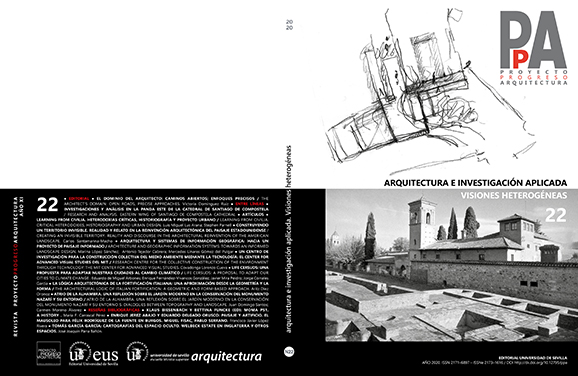LEARNING FROM CIVILIA. HETERODOXIAS CRÍTICAS, HISTORIOGRAFÍA Y PROYECTO URBANO / LEARNING FROM CIVILIA. CRITICAL HETERODOXIES, HISTORIOGRAPHY AND URBAN DESIGN
DOI:
https://doi.org/10.12795/ppa.2020.i22.02Palabras clave:
townscape, brutalismo, ficción, collage, fotografía / Townscape, Brutalism, Fiction, Collage, PhotographyResumen
RESUMEN Desde su primera publicación en 1971 como número especial de The Architectural Review, Civilia, The End of Suburban Man ha permanecido como un documento anómalo dentro de la historia de la teoría y la crítica arquitectónica. Profusamente ilustrado con collages hechos a partir de cientos de fotografías de edificios publicados en las páginas de la revista, el libro describía con un lenguaje cercano al manifiesto y en gran detalle una ficticia new town inglesa construida en una cantera abandonada. Situada en un difuso terrain vague entre ficción, sátira y propuesta genuina, Civilia era tanto una crítica al urbanismo inglés de posguerra y a las propuestas urbanas de la modernidad en general como una vívida ilustración del concepto de townscape que la revista llevaba promocionando varias décadas. “Learning from Civilia” ofrece una revisión crítica del contenido del libro, las circunstancias de su confección y su recepción, introduciendo finalmente The Civilia Project, una iniciativa de la Universidad de Newcastle que, integrando investigación y docencia, propone reexaminar Civilia no solo por su interés historiográfico, sino por su valor como herramienta de proyecto y por la relevancia que su discurso mantiene hoy en día, más aún, si cabe, en relación con el planeamiento urbano.
SUMMARY Since its first publication in 1971 as a special issue of The Architectural Review, Civilia, The End of Suburban Man has remained an anomalous document within the history of Architectural Theory and Criticism. Profusely illustrated with collages made from hundreds of photographs of buildings published in the pages of the magazine, the book described, in great detail and with a language close to that of the manifesto, a fictional English New Town built in an abandoned quarry. Located in a diffuse terrain vague between fiction, satire and true proposal, Civilia was both a critique of post-war English urbanism and the urban proposals of modernity in general, standing as a vivid illustration of the concept of Townscape that the magazine had been promoting for several decades. ‘Learning from Civilia’ offers a critical review of the content of the book, the circumstances of its creation and its reception, and introduces The Civilia Project. An initiative of the University of Newcastle, The Civilia Project integrates research and teaching, and proposes a reexamination of Civilia not only due to its historiographic significance, but also because of its value as a design tool and for the relevance that its discourse maintains today, especially, in relation to urban planning.
Descargas
Citas
AA. VV. Civilia: The Professionals Comment. En: The Architects’ Journal. Londres: The Architectural Press, 30 junio 1971, Vol. 153, n.º 23, pp. 1452-1455.
ASTRAGAL. BBC’s Civilia. En: The Architects’ Journal. Londres: The Architectural Press, 1 diciembre 1971, Vol. 154, n.º 48, p.1214.
ASTRAGAL. Browne in Nuneaton. En: The Architects Journal. Londres: The Architectural Press, 29 marzo 1972, Vol. 155, n.º 13, p. 647.
BANHAM, P. Reyner. De Wolfe the Author? En: The Architectural Review. Londres: The Architectural Press, noviembre 1975, Vol. 158, n.º 945, p. 322.
Bristol Docks Opportunity. En: The Architects’ Journal, 27 marzo 1974. Londres: The Architectural Press, Vol. 159, n.º 13, p. 651.
BRUNO, Giuliana. Ramble City: Postmodernism and Blade Runner. En: October. Cambridge, Mass.: MIT Press, verano 1987, Vol. 41, n.º 102, pp. 61-74.
CULLEN, Gordon: Townscape Casebook. En: The Architectural Review. Londres: The Architectural Press, diciembre 1949, Vol. 106, n.º 636, pp. 363-374.
CULLEN, Gordon. New Marlow. En: The Architectural Review. Londres: The Architectural Press, julio 1950, vol. 108, n.º 643, pp. 56-67.
CULLEN, Gordon. Townscape. Londres: The Architectural Press, 1961.
DE WOFLE (sic), Ivor. Civilia: The End of Suburban Man; A Challenge to Semidetsia, Londres: The Architectural Press, 1971.
DE WOLFE, Ivor. “Townscape. A Plea for an English Visual Philosophy Founded on the True Rock of Sir Uvedale Price”. En: The Architectural Review. Londres: The Architectural Press, diciembre 1949, Vol. 106, n.º 636, pp. 354-62.
DE WOLFE, Ivor. The Italian Townscape. Nueva York: G. Braziller, 1966.
DE WOLFE, Ivor. Civilia: The End of Suburban Man; A Challenge to Semidetsia.
The Architectural Review. Londres: The Architectural Press, junio 1971, Vol. 149, n.o 892, pp. 326-408.
ERTEN, Erdem. I, The World, The Devil and The Flesh: Manplan, Civilia and H. de C. Hastings. En: The Journal of Architecture. Londres: Routledge, 2012, Vol. 17, n.º 5, pp. 703-718.
ERTEN, Erdem. Townscape as a Project and strategy of cultural continuity. En: John PENDLEBURY; Erdem ERTEN; Larkham J. PETER, eds. Alternative Visions of Post-War Reconstruction: Creating the modern townscape. Londres-Nueva York: Routledge, 2015, pp. 35-53.
GLANCEY, Jonathan. Townscape and the AR: Humane Urbanism in the 20th Century. En: The Architectural Review [online], 7 junio 2013 [consulta: 23-09-2019]. Disponible en: https://www.architectural-review.com/essays/viewpoints/townscape-and-the-ar-humane-urbanism-in-the-20th-century/8648215.article
HEATH, Stephen D. Back to the Picturesque? En: The Architects’ Journal. Londres: The Architectural Press, 18 diciembre 1974, Vol. 160, n.º 61, pp. 1410.
MOORCRAFT, Colin. Spoilt-tip City by Colin Moorcraft. En: New Scientist. Londres: New Science Publications, 16 diciembre 1971, Vol. 52, n.º 774, p. 180.
MULLIN, Stephen. Civilia (Book Review). En: New Society. Londres: New Society Ltd., 9 diciembre 1971, Vol. 18, n.º 480, p. 1161.
NAIRN, Ian. Outrage. The Architectural Review. Londres: The Architectural Press, junio 1955, Vol. 117, n.º 702. Reeditado como: NAIRN, Ian. Outrage: On the Disfigurement of Town and Countryside. Londres: The Architectural Press, 1959, pp. 363-460.
NAIRN, Ian. Counter Attack. The Architectural Review. Londres: The Architectural Press, December 1956, Vol. 120, n.º 719, Reeditado como: NAIRN, Ian. Counter Attack Against Subtopia. Londres: The Architectural Press, 1957.
POWERS, Alan. Civilia Revisited, c2018 (no publicado). Introducción en: DE WOLFE, Ivor. Civilia: The End of Sub Urban Man. Londres: Artifice Press, 2018 (no publicado).
THE EDITOR. “The Second Half Century”. En: The Architectural Review, 1947, Vol. 101, n.o 601.
WILLIAMS, Richard J. The Anxious City: British Urbanism in the late 20th Century. Londres: Routledge, 2004
Descargas
Publicado
Cómo citar
Número
Sección
Licencia
Las ediciones impresa y electrónica de esta Revista son editadas por el Secretariado de Publicaciones de la Universidad de Sevilla, siendo necesario citar la procedencia en cualquier reproducción parcial o total.
Salvo indicación contraria, todos los contenidos de la edición electrónica se distribuyen bajo una licencia de uso y distribución “Creative Commons Atribución-NoComercial-SinDerivar 4.0 Internacional” ![]() . Puede consultar desde aquí la versión informativa y el texto legal de la licencia. Esta circunstancia ha de hacerse constar expresamente de esta forma cuando sea necesario.
. Puede consultar desde aquí la versión informativa y el texto legal de la licencia. Esta circunstancia ha de hacerse constar expresamente de esta forma cuando sea necesario.
Los autores/as que publiquen en esta revista aceptan las siguientes condiciones:
- Los autores/as conservan los derechos de autor y ceden a la revista el derecho de la primera publicación, con el trabajo registrado con la licencia de atribución de Creative Commons, que permite a terceros utilizar lo publicado siempre que mencionen la autoría del trabajo y a la primera publicación en esta revista.
- Los autores/as pueden realizar otros acuerdos contractuales independientes y adicionales para la distribución no exclusiva de la versión del artículo publicado en esta revista (p. ej., incluirlo en un repositorio institucional o publicarlo en un libro) siempre que indiquen claramente que el trabajo se publicó por primera vez en esta revista.
- Se permite y recomienda a los autores/as a publicar su trabajo en Internet (por ejemplo en páginas institucionales o personales) antes y durante el proceso de revisión y publicación, ya que puede conducir a intercambios productivos y a una mayor y más rápida difusión del trabajo publicado (vea The Effect of Open Access).









